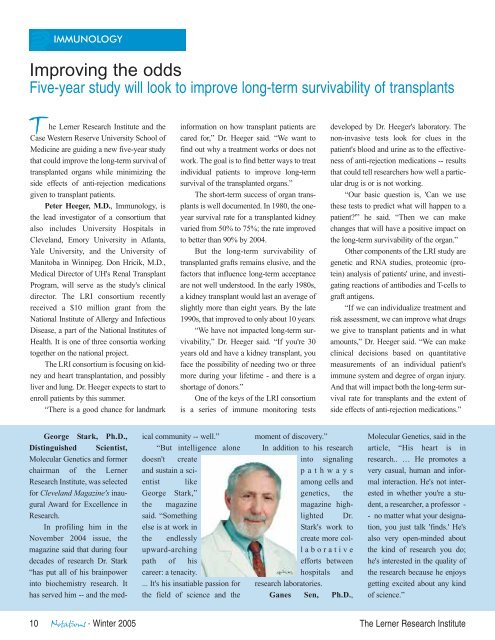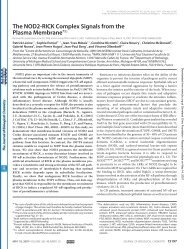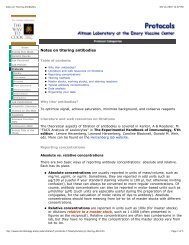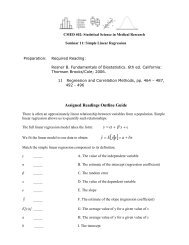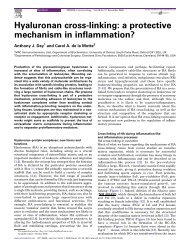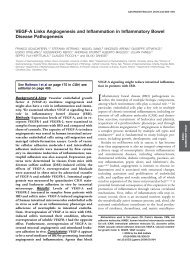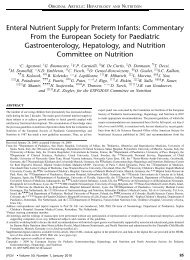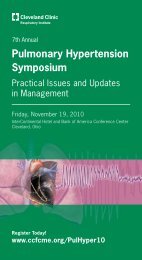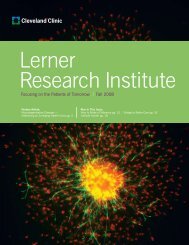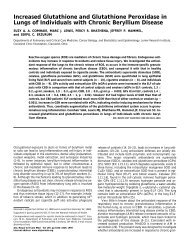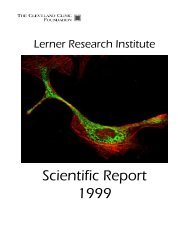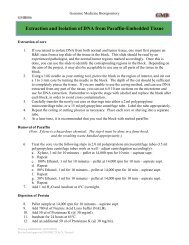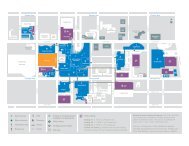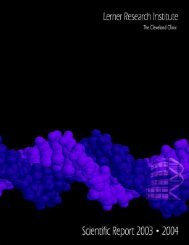The Lerner Research Institute Notations - Cleveland Clinic Lerner ...
The Lerner Research Institute Notations - Cleveland Clinic Lerner ...
The Lerner Research Institute Notations - Cleveland Clinic Lerner ...
- No tags were found...
Create successful ePaper yourself
Turn your PDF publications into a flip-book with our unique Google optimized e-Paper software.
IMMUNOLOGYImproving the oddsFive-year study will look to improve long-term survivability of transplants<strong>The</strong> <strong>Lerner</strong> <strong>Research</strong> <strong>Institute</strong> and theCase Western Reserve University School ofMedicine are guiding a new five-year studythat could improve the long-term survival oftransplanted organs while minimizing theside effects of anti-rejection medicationsgiven to transplant patients.Peter Heeger, M.D., Immunology, isthe lead investigator of a consortium thatalso includes University Hospitals in<strong>Cleveland</strong>, Emory University in Atlanta,Yale University, and the University ofManitoba in Winnipeg. Don Hricik, M.D.,Medical Director of UH's Renal TransplantProgram, will serve as the study's clinicaldirector. <strong>The</strong> LRI consortium recentlyreceived a $10 million grant from theNational <strong>Institute</strong> of Allergy and InfectiousDisease, a part of the National <strong>Institute</strong>s ofHealth. It is one of three consortia workingtogether on the national project.<strong>The</strong> LRI consortium is focusing on kidneyand heart transplantation, and possiblyliver and lung. Dr. Heeger expects to start toenroll patients by this summer.“<strong>The</strong>re is a good chance for landmarkinformation on how transplant patients arecared for,” Dr. Heeger said. “We want tofind out why a treatment works or does notwork. <strong>The</strong> goal is to find better ways to treatindividual patients to improve long-termsurvival of the transplanted organs.”<strong>The</strong> short-term success of organ transplantsis well documented. In 1980, the oneyearsurvival rate for a transplanted kidneyvaried from 50% to 75%; the rate improvedto better than 90% by 2004.But the long-term survivability oftransplanted grafts remains elusive, and thefactors that influence long-term acceptanceare not well understood. In the early 1980s,a kidney transplant would last an average ofslightly more than eight years. By the late1990s, that improved to only about 10 years.“We have not impacted long-term survivability,”Dr. Heeger said. “If you're 30years old and have a kidney transplant, youface the possibility of needing two or threemore during your lifetime - and there is ashortage of donors.”One of the keys of the LRI consortiumis a series of immune monitoring testsdeveloped by Dr. Heeger's laboratory. <strong>The</strong>non-invasive tests look for clues in thepatient's blood and urine as to the effectivenessof anti-rejection medications -- resultsthat could tell researchers how well a particulardrug is or is not working.“Our basic question is, 'Can we usethese tests to predict what will happen to apatient?'” he said. “<strong>The</strong>n we can makechanges that will have a positive impact onthe long-term survivability of the organ.”Other components of the LRI study aregenetic and RNA studies, proteomic (protein)analysis of patients' urine, and investigatingreactions of antibodies and T-cells tograft antigens.“If we can individualize treatment andrisk assessment, we can improve what drugswe give to transplant patients and in whatamounts,” Dr. Heeger said. “We can makeclinical decisions based on quantitativemeasurements of an individual patient'simmune system and degree of organ injury.And that will impact both the long-term survivalrate for transplants and the extent ofside effects of anti-rejection medications.”George Stark, Ph.D.,Distinguished Scientist,Molecular Genetics and formerchairman of the <strong>Lerner</strong><strong>Research</strong> <strong>Institute</strong>, was selectedfor <strong>Cleveland</strong> Magazine's inauguralAward for Excellence in<strong>Research</strong>.In profiling him in theNovember 2004 issue, themagazine said that during fourdecades of research Dr. Stark“has put all of his brainpowerinto biochemistry research. Ithas served him -- and the medicalcommunity -- well.”“But intelligence alonedoesn't createand sustain a scientistlikeGeorge Stark,”the magazinesaid. “Somethingelse is at work inthe endlesslyupward-archingpath of hiscareer: a tenacity.... It's his insatiable passion forthe field of science and themoment of discovery.”In addition to his researchinto signalingpathwaysamong cells andgenetics, themagazine highlightedDr.Stark's work tocreate more collaborativeefforts betweenhospitals andresearch laboratories.Ganes Sen, Ph.D.,Molecular Genetics, said in thearticle, “His heart is inresearch.. … He promotes avery casual, human and informalinteraction. He's not interestedin whether you're a student,a researcher, a professor -- no matter what your designation,you just talk 'finds.' He'salso very open-minded aboutthe kind of research you do;he's interested in the quality ofthe research because he enjoysgetting excited about any kindof science.”10 <strong>Notations</strong> · Winter 2005 <strong>The</strong> <strong>Lerner</strong> <strong>Research</strong> <strong>Institute</strong>


